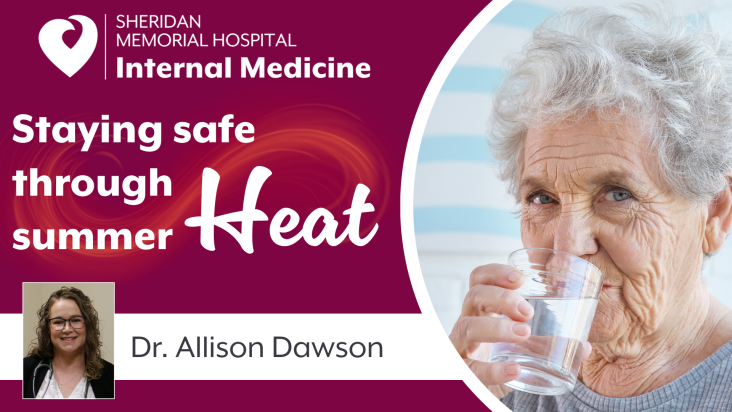By Dr. Allison Dawson is a physician with Sheridan Memorial Hospital’s Internal Medicine Clinic. She is trained in palliative care and hospice medicine and also oversees care for residents at Sheridan Green House, a long-term care facility.
For many of us, the summer months bring outdoor activities we have been looking forward to throughout the colder months. However, it is important to note hot weather and outdoor activities don’t always mix well.
As summer temperatures climb, we face heightened risks from the increasing heat.
A particularly hot season can cause people to suffer from heat-related illness, and even death. Older adults (as well as young children and people with chronic medical conditions) are particularly prone to heat-related issues. As we age, the ability to regulate temperature changes and chronic health conditions can worsen in the heat.
Ways to combat heat
Fortunately, there are effective strategies to keep cool and safe during hot weather.
- Stay hydrated: Drink water regularly. Consider the addition of electrolyte containing options such as Pedialyte and Gatorade zero.
- Dress smart: Opt for light, loose-fitting clothing to allow the body to cool naturally.
- Cool environments: Spend time in air-conditioned spaces or use fans to circulate air. The library or local community center can be great options if air conditioning isn’t available at home.
- Time it right: Avoid outdoor activities between 10 a.m. and 4 p.m. when the sun is at its peak and temperatures are warmest. Plan indoor activities during the hot hours.
- Cooling tricks: Take cool showers; apply cold cloths to your neck and face or even wear a wet T-shirt.
Preparation is key. If going outside is necessary, wearing sunscreen and a hat provides extra protection. Try to also stay in shaded areas.
Caregivers and family members play a vital role. Set up a check-in schedule that ensures elderly loved ones living alone have support during the hot months.
Know your risks
Certain factors can predispose an individual to heat intolerance. These can include:
- Functional attributes such as low physical fitness, lack of acclimatization or obesity.
- Acquired factors like alcohol use, medications/supplements, dehydration, viral or bacterial infections, previous heat stroke or sweat gland dysfunction.
Signs of heat sickness
Heat-related illnesses can escalate quickly, so early recognition is essential.
Heat exhaustion: Some symptoms include fast heart rate, low blood pressure, weakness, profuse sweating, headache and vomiting
Heat stroke: A life-threatening condition marked by a high body temperature (above 104.9 degrees F) and central nervous system dysfunction, which can present in a wide range of possibilities such as disorientation, confusion, altered consciousness or seizure.
Seek immediate medical attention if you or a loved one develop symptoms of heat illness.
With summer heat on the rise, protecting our loved ones and ourselves is a priority. By understanding the risks and taking proactive steps – like staying hydrated and cool – we can prevent dangerous heat-related illnesses.
Dr. Allison Dawson is a physician with the Internal Medicine team at Sheridan Memorial Hospital. She is trained in palliative care and hospice medicine. If you would like to make an appointment with Dr. Allison Dawson, call or text 307.675.2650.

